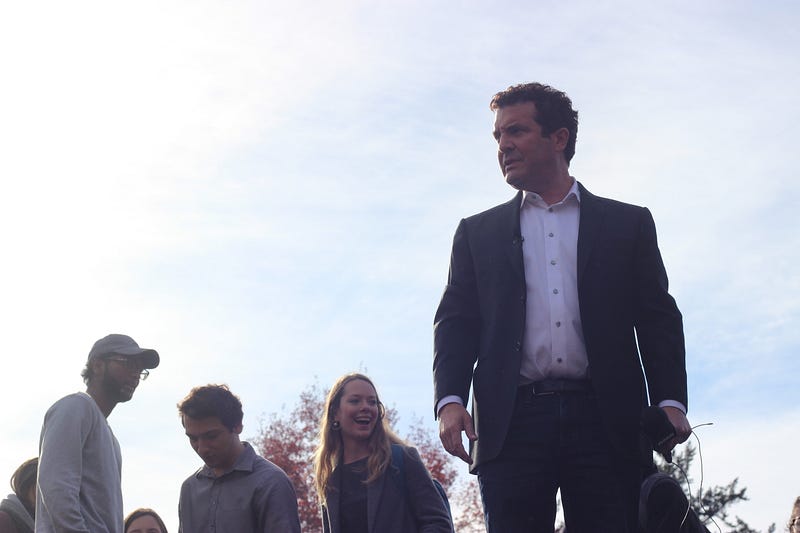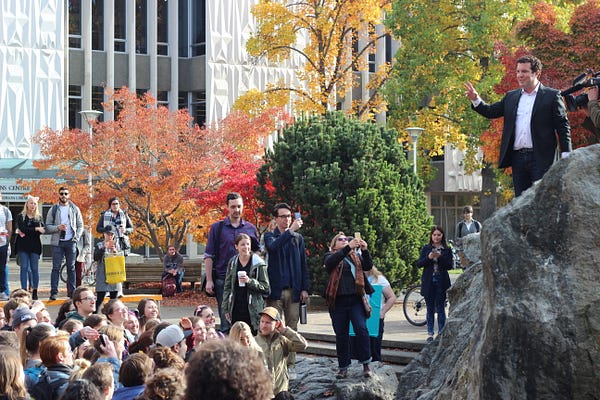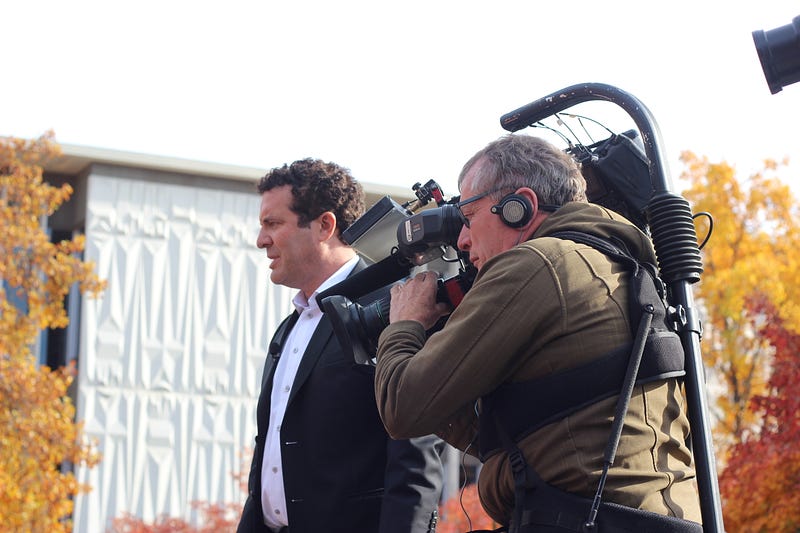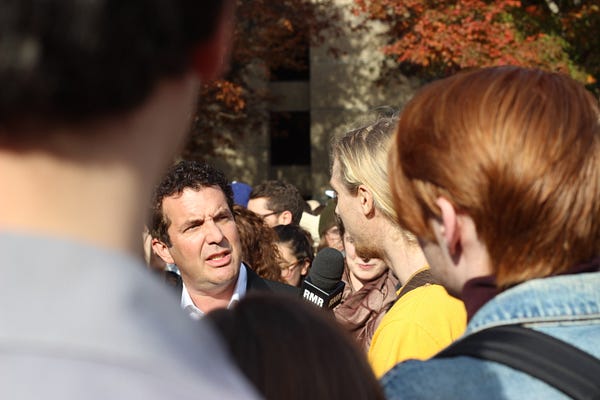TV star was on campus filming episode of Rick Mercer Report’s final season
Rick Mercer, Canadian TV icon, recently visited the university campus while filming an episode of the final season of the Rick Mercer Report (RMR). The show, a staple on Canadian television since 2004, sees Mercer travel from coast to coast to coast in Canada, interviewing Canadians and offering his own take on the latest news stories.
With the 150th anniversary of confederation in our minds, Martlet co-editors Sarah Lazin and Cormac O’Brien sat down with Rick Mercer and asked him some important questions (What does it mean to be Canadian?) and some not-so-important ones (Are you coming back to sing more opera?).

Rick Mercer: There’s never any guarantee what’s going to be in the piece or not, but we talked to the president, and then we went to the prosthetics lab — there’s the [Victoria Hand Project].
They have a non-profit that’s been started here at the university, and they’re 3D printing affordable prosthetics for the developing world. That’s pretty awesome. I happen to know a lot of people who have prosthetics, and it’s fascinating.
[We’re in] the cutting edge age of prosthetics, but they’re getting more and more expensive. For people I know, they have like legs that cost 45 000 dollars and stuff, which is awesome, but they obviously can’t have those in developing world. So, this is really cool — seeing the 3D printed prosthetics.
Then we went to the lab where they’re working on making skin, 3D printing skin, and these bandages that will tell you whether you have an infection or not. That’s pretty cool.
I’m not a science geek, but I always love it when I can put something on television and make it appeal to non-science geeks, and I think that we probably pulled that off. Oh, and I went and got an opera lesson, singing. Never done that before.
How’d it go?
Well I always thought I couldn’t sing but he convinced me that I, maybe, potentially, might be able to in the future. So I’ll be back doing my degree in opera.
Do you get anything talking to university students that you don’t get talking to other parts of the population?
I always like coming to campuses because you get a wide cross-section of people. Like if you go to a work environment — I mean people are always different — but if you’re on a fishing boat, you’ll get [to] know, everyone there is a fisherman or a fisherwoman. So, they may be more similar, [but] at a university, there’s just always diversity. You’re talking to an opera singer and then a science nerd.

Photo by Cormac O’Brien, Editor-in-Chief
I wouldn’t say my mindset has shifted at all, other than I’m probably cognizant of what a great job it is, more than I had been before. I’ve always been aware of that, always been grateful for the job, and I always say that I’m incredibly lucky and it’s a great gig, but knowing that I’m close to the end — yeah, makes it all a little bittersweet, y’know?
And, y’know, seeing that many young people come out who watch the show means a lot to me. It means a lot to anyone who works a lot in television if they can get anyone under the age of 50 who recognize them from conventional television. So the fact that I had three or four hundred university students show up, that’s pretty amazing. For “conventional TV” we’re not dead yet.
Do you have something that you’re going to take away from the past, however many, years of TV going forward?
What I take away from it is what could be called industrial knowledge — or institutional knowledge. Of the country, I think.
Y’know, I have been travelling the country non-stop for 15 years. That’s both during the TV season and in the off-season, ’cause that’s when I do live performances. So y’know a lot of what travelling to a place does is it informs you in your bones in a way that you won’t pick it up reading an article or watching a documentary. So, I don’t want to say a vast body of knowledge because that sounds a bit pretentious, but I would say that I would have a pretty good institutional knowledge of the way the country works.
You’re on a university campus — pretentious pretty much goes with the territory.
I travel the country so much that someone says to me, ‘do you get to British Columbia that often?’ and I could easily say, ‘oh, you know, I do, but I didn’t get out to it that much this year — I was probably there 11 times.’ For most people that would be a lot, but for me that’s just like, ‘well I didn’t get there as much as I usually do.’ And every part of the country is like that except for the North, and I usually get to the North two to three times a year.
Is there anything particularly special about [Vancouver] Island?
I’ve got in trouble for this before — for saying that Tofino is my favourite beach — because I come from Newfoundland and suggesting that any beach outside of Newfoundland is your favourite is pretty close to treasonous.
We’ll wipe that off the record.
The beauty is just astounding. I mean, yesterday I was in the Gulf Islands on a helicopter, landing on one of the islands — Mayne Island — and we’re working with the coast guard. They have a radar tower up there. And 360 degrees, I don’t think I’ve ever seen anything more beautiful in my life. I mean it was unbelievable. And I don’t need to tell you that, I mean everyone knows. Even talking to the students out there, like, ‘what do you like about UVic?’ I mean I think to a single person they all mentioned just how beautiful it is.
Did you have any advice for any aspiring student comics?
My advice for comics would be the same that I would give to anyone in any kind of creative field, or any media field, is that you just have to produce. You have to produce content. And there’s, y’know, a lot of people who rationalize not producing content, but there is no excuse for not producing content. Writers write, and comedians tell jokes, and they do comedy cabarets and if there is no comedy club then you have to go find a room with your friends and make it happen. And if there’s no student newspaper then you start your own newspaper, and, y’know, if you want to be a filmmaker you start shooting short films.

Photo by Cormac O’Brien, Editor-in-Chief
That’s something that I started doing very early, and it led to everything in my career. And I don’t want to sound like an old man and say, ‘in my day it was harder,’ but in my day, to make the first short film we made we had to raise $800 to pay for the film and the film developing because we were literally shooting it on film. Which is absurd, because now I can just do it on my smartphone.
So it’s easier now. And it’s no excuse. I mean, you work for a student newspaper but if someone doesn’t get a job at the student newspaper that’s no excuse — you can just publish yourself now. So my advice would be to create content. If I’m looking to hire people, and I quite often am, in creative fields, if they haven’t been doing that on their own, I wouldn’t really consider hiring them, quite frankly. Because I don’t think they’re serious about it.
When most people would ask, ‘Who is Canadian?’, Rick Mercer is one of those names. Do you feel that Canadian-ness within you that people maybe ascribe to you?
No — I mean I think for a lot of people, being Canadian informs their work, whatever field they’re in. Certainly creative fields. For me, it’s been a bigger part of my work than I think perhaps most people’s. Because [the Rick Mercer Report] does tackle that age old question, ‘What does it mean to be Canadian?’ and I’ve kinda been exploring that question my entire professional life, and I’m no closer to an answer than I was at the beginning. But I have been exploring that notion.
Canadians spend a lot of time pondering that question. Americans? No. They don’t spend a minute wondering what it means to be American. They might all have different answers but they all know, 100 per cent. People from the U.K., don’t sit around and wonder, ‘what does it mean to be from the U.K.?’ Canadians spend a lot of time wondering about those things. We actually had a Royal Commission at one point that looked into the question of what does it mean to be a Canadian. I mean, it’s ridiculous.
Did they have findings?
I’m sure they did — although I’m sure they left it up for further study! There was no simple answer, that’s for sure.
I consider myself really lucky that because I’ve travelled so much and because I’ve done so many pieces that people are generally pretty happy to see me coming, no matter where I am in the country. And Canada’s complicated that way . . . people in Atlantic Canada look at certain people as their own, and people in Western Canada look at certain people as their own. I like to think wherever I go, people think, ‘Oh and here he is! He’s one of ours.’ because I’ve spent so much time in all these places.
There’s a lot of differences in this country, and that’s a good thing. It’s certainly a good thing. And it’s just the nature of the beast — it just is. I mean, we’re so bloody big. It’s almost impossible to get around the country, let alone the way I do it.

Photo by Cormac O’Brien, Editor-in-Chief
Do people ask you, ‘Can you tell us what it means to be Canadian?’
Eh, I mean yeah. But I don’t have an answer, so don’t ask me that! I’m far too tired for that. Yeah, people sometimes think that I have some great insight, and I rarely think that I do, but then if I kind of think about it — like I said, that institutional knowledge kicks in.
A lot of people have a lot of opinions on Canada, and based on the regional differences that we have, what happens is they have a lot of opinions on parts of Canada they’ve never been to. So, you know, you can take their opinion with a grain of salt, quite frankly.
So when you do tell us, we’ll know it’s right, then.
It’ll be quasi-informed, anyway.







